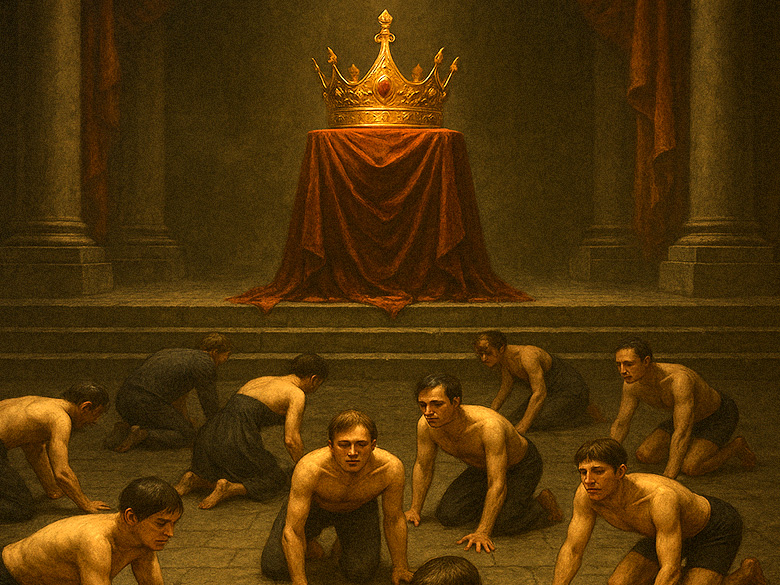
Sunday mornings in our home have a peculiar tradition: we turn on Christian radio—not to worship, but to wonder what the hell happened. It’s a ritual of cringe. A mix of auto-tuned piety and theological cosplay that would be hilarious if it weren’t so tragic.
There’s a common thread in the lyrics—one that wraps itself around modern Christianity like a velvet noose: Jesus is King. God is sovereign. We are nothing. Repeat ad nauseam until the beat drops. It’s not worship—it’s submission training. And it’s preparing believers for something more insidious than salvation.
The Throne Room Fetish
The language of kingship is everywhere in modern worship. “Crown Him,” “He reigns,” “bow before the throne,” “Majesty.” It’s like every praise song was ghostwritten by a court jester trying to impress the king before being executed.
But let’s be clear: Jesus wasn’t about thrones. He wasn’t building a kingdom with walls and taxes and soldiers. He wasn’t launching a divine monarchy. He was upending power—not ascending to it.
So why the king-talk obsession? Why the throne room fetish? Because worship music has stopped being about spiritual connection. It’s now a liturgy of surrender, and the god it bows to often looks more like Caesar than Christ.
Worms and Kings
At the core of so much evangelical theology is this toxic feedback loop:
God is good, and you are garbage.
Worm theology, they call it. You’re depraved. Broken. Unworthy. Hopeless. Totally reliant on divine grace. And if you believe that long enough, you start to need a King. Not just any king—a powerful, unquestionable, omnipotent one. The more helpless or worthless you feel, the more you crave someone who can boss you around and make it all better.
It’s like a cosmic kink: beg for mercy, get told you’re loved in spite of yourself, then sing about how much you love being ruled. It’s not faith—it’s spiritual Stockholm syndrome.
Disciples or Subjects? (Spoiler: It’s Subjects)
Jesus said, “Go make disciples,” not “Go build empires.” But somewhere along the way, we traded relationship for rulership. Being a disciple—a student, a follower, a learner—was too vulnerable, too messy. So we turned it into subjugation.
We made God a king.
We made Jesus a king.
We made pastors kings of their churches.
And husbands kings of their homes.
This theology scales beautifully—from the nuclear family to the national flag. It trains people to obey power without question. And when that power wears a cross, anything it does must be holy, right?
Right?
Worship as Submission Training
Modern worship is less “connecting with the divine” and more “learning to kneel on command.” It’s full of language that conditions surrender: “Take my life,” “I bow down,” “You reign.” If it had a bassline and a safeword, it’d be banned in most red states.
Even the hymns aren’t innocent. “Onward Christian Soldiers” isn’t a metaphor—it’s a battle cry. We’ve been singing imperialist theology for centuries. The only difference is that today’s songs come with fog machines and better haircuts.
It’s all training: not to love, not to serve, not to think—but to obey.
Jesus, the Anti-King
This is what makes the whole thing so absurd. Jesus rejected kinghood. When they tried to crown him, he slipped away. When Pilate asked if he was king, Jesus shrugged and said, “You said it, not me.”
His kingdom wasn’t of this world—and it certainly wasn’t modeled after it. He told his followers not to rule like Gentile kings. He washed feet. He fed outcasts. He challenged religious gatekeepers and welcomed the unclean.
And yet somehow, we ended up turning him into a medieval lord who demands praise and punishes disobedience. That’s not Christ—that’s cultural projection.
Why We Keep Choosing Saul
This isn’t new. People have always begged for kings. “Give us a ruler,” they said in the Old Testament. “Make it easier for us to follow.”
It’s hard to follow a teacher. A teacher makes you think. But a king? You just obey. You shut off your brain and take orders.
We built a golden calf.
We picked Saul.
We crowned Caesar in God’s name.
And now we sing to a throne while the poor starve and the powerful get richer.
Exit the Throne Room
Christianity doesn’t need more kings. It doesn’t need more crowns. It doesn’t need another damn throne room anthem.
What it needs is a reintroduction to Jesus—not the king of kings, but the servant of servants. The one who said, “Follow me,” not “Bow to me.”
So maybe next Sunday, don’t sing. Just listen. Ask yourself: is this worship, or is it a fantasy of surrender? And who benefits when faith looks more like submission than transformation?
Because in the end, the church doesn’t need a dom. It needs a reckoning.
For more Snarky Faith, check out the podcast and more:
- Snarky Faith website
- Snarky Faith on Instagram: @stuartdelony
- Snarky Faith on YouTube: @snarkyfaith
- Snarky Faith on Bluesky: @snarkyfaith.bsky.social
- Snarky Faith Group on Facebook: www.facebook.com/snarkyfaith
- Snarky Faith t-shirts and mugs available here.














